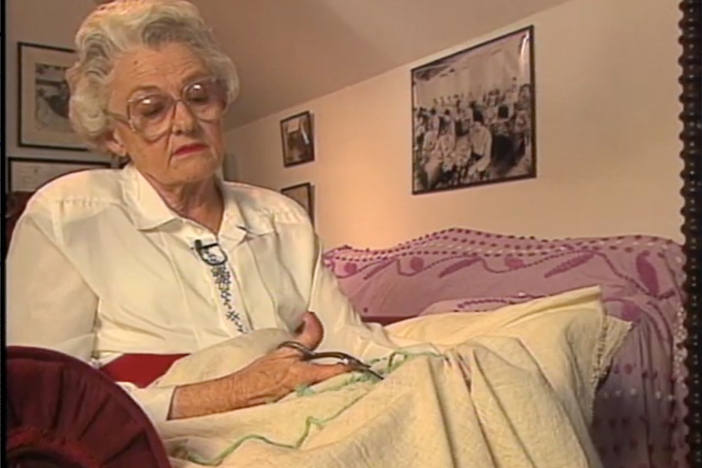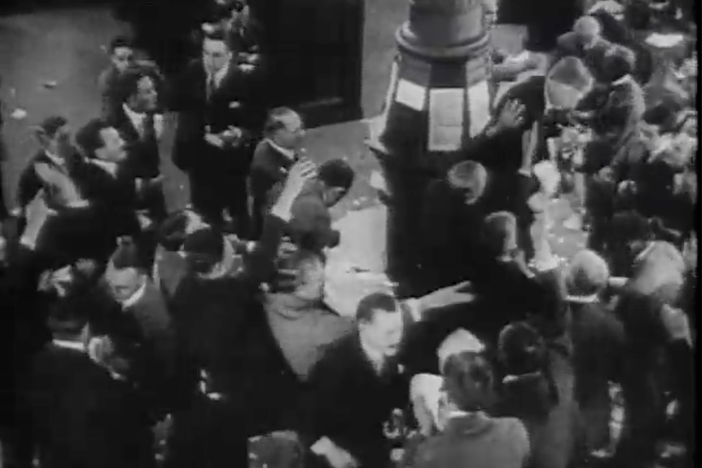How Depressed Was Georgia in the Great Depression?
Dan Carter, a historian at Emory University, explains how the stock market crash triggered the Great Depression and led to a downward economic spiral of factories and banks closing, job losses, and no money for food, clothing, or any of life’s necessities. Wilkes County resident Russell Slayton and his daughter Betty discuss life in Georgia in those days, along with Mabel Johnson, who was a young girl at the time. Carter reports that conditions began to improve with the election of Franklin Delano Roosevelt in 1932. Many New Deal programs came to Georgia and gave people a boost.
How Depressed Was Georgia in the Great Depression?
Dan Carter, a historian at Emory University, explains how the stock market crash triggered the Great Depression and led to a downward economic spiral of factories and banks closing, job losses, and no money for food, clothing, or any of life’s necessities. Wilkes County resident Russell Slayton and his daughter Betty discuss life in Georgia in those days, along with Mabel Johnson, who was a young girl at the time. Carter reports that conditions began to improve with the election of Franklin Delano Roosevelt in 1932. Many New Deal programs came to Georgia and gave people a boost.
Social Studies
Explain economic factors that resulted in the Great Depression. (e.g., boll weevil and drought).
1. Explain the impacts of job loss on the economy.
2. Explain how the Great Depression started a decade earlier for Georgians than the rest of the country.
3. How did some people make ends meet during the Great Depression?
1. Take notes while watching the video and complete a table with the following headings: Economic Problems in Georgia (1920s); Economic Problems in the United States (1930s); Examples of Ways Georgians Coped with the Depression; Steps toward Recovery. Include two entries under each heading.
2. What are the basic necessities of life? If you and your family lost everything you had, including your house, what “things” would you need to acquire in order to live? Make sure these are only the basic necessities – only what you would need to live. Once you make your list, make phone calls or go online to find out how much all of this would cost. What kind(s) of jobs would you need to have in order to be able to afford these necessities? How much would you have to make per year? Per month?
almshouses: publicly funded places where the poor could live. For people who lost their homes in the Depression, the almshouse (or, as it was less euphemistically known, the "poorhouse") became an option
Civil Works Administration (CWA): a government program started in the 1930s in order to get people working during the Depression
destitute: without hope, without money, and without a whole lot to look forward to
expenditure: what amount of money one spends or pays out in an allotted time (for example, the State Department of Public Welfare paid between $3 and $4 to the average Georgia family each month)
The Great Depression: a period associated with the 1930s following the October 1929 crash of the stock market that was typified by high unemployment, the closings of many banks, and the plummeting value of the dollar
malaria: a disease carried by mosquitoes that remains one of the world's most lethal diseases
transients: people passing through a region; temporary residents
typhoid fever: a disease spread by bacteria, usually found on poor drinking water or food
unemployed: a workingclass person who is without work
welfare: usually refers to a program wherein the local or federal government distributes money to the needy
1. Explain the impacts of job loss on the economy.
As people lost their jobs, they had no income to spend on goods and services. Without this demand, many businesses closed or laid off more workers, further contributing to the economic turmoil. Eventually, 1 out of every 4 Americans was without a job. No jobs meant no food, so people would line up for hours outside of soup kitchens.
2. Explain how the Great Depression started a decade earlier for Georgians than the rest of the country.
Prior to the Stock Market Crash, the boll weevil greatly impacted Georgia's cotton production--a major industry in the state. Cotton prices hit rock bottom during the 1920s.
3. How did some people make ends meet during the Great Depression?
Some people created side businesses that would pay for groceries. The example in the video was a mother who sold homemade candies for a nickel. Others would barter and trade items rather than exchange money. Some of the better off people would share with others during this time.


